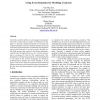1676 search results - page 30 / 336 » Formal Development of Self-organising Systems |
ERSHOV
1993
Springer
14 years 29 days ago
1993
Springer
Distributed database applications are a wide use of distributed systems. One of the major advantages of distributed database systems is the potential for achieving high availabili...
FOIS
2010
13 years 10 months ago
2010
Abstract. The paper presents preliminary results in the area of ontological engineering for historical research. Historical information systems are still in the initial stage of de...
FM
1991
Springer
14 years 11 days ago
1991
Springer
An important goal of software engineering is to exploit commonalities in system design in order to reduce the complexity of building new systems, support largescale reuse, and pro...
HICSS
2002
IEEE
14 years 1 months ago
2002
IEEE
Currently a number of these on-line support systems for electronic contracting are under development. In this paper we develop a logical formalism to represent the content of busi...
SIGSOFT
2010
ACM
13 years 6 months ago
2010
ACM
Almost all fundamental advances in science and engineering crucially depend on the availability of extremely capable high performance computing (HPC) systems. Future HPC systems w...

